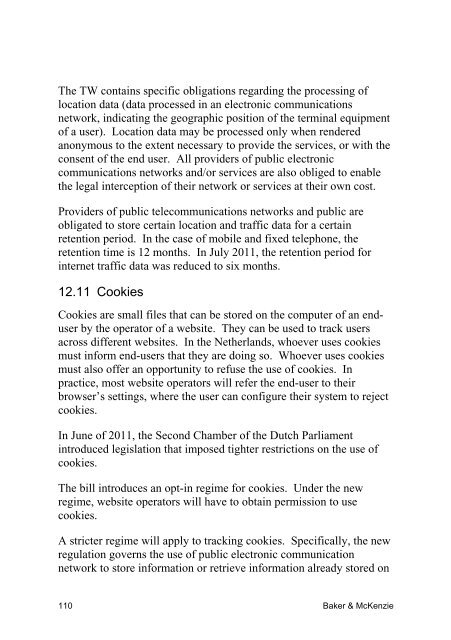Doing Business in the Netherlands 2012 - American Chamber of ...
Doing Business in the Netherlands 2012 - American Chamber of ...
Doing Business in the Netherlands 2012 - American Chamber of ...
Create successful ePaper yourself
Turn your PDF publications into a flip-book with our unique Google optimized e-Paper software.
The TW conta<strong>in</strong>s specific obligations regard<strong>in</strong>g <strong>the</strong> process<strong>in</strong>g <strong>of</strong><br />
location data (data processed <strong>in</strong> an electronic communications<br />
network, <strong>in</strong>dicat<strong>in</strong>g <strong>the</strong> geographic position <strong>of</strong> <strong>the</strong> term<strong>in</strong>al equipment<br />
<strong>of</strong> a user). Location data may be processed only when rendered<br />
anonymous to <strong>the</strong> extent necessary to provide <strong>the</strong> services, or with <strong>the</strong><br />
consent <strong>of</strong> <strong>the</strong> end user. All providers <strong>of</strong> public electronic<br />
communications networks and/or services are also obliged to enable<br />
<strong>the</strong> legal <strong>in</strong>terception <strong>of</strong> <strong>the</strong>ir network or services at <strong>the</strong>ir own cost.<br />
Providers <strong>of</strong> public telecommunications networks and public are<br />
obligated to store certa<strong>in</strong> location and traffic data for a certa<strong>in</strong><br />
retention period. In <strong>the</strong> case <strong>of</strong> mobile and fixed telephone, <strong>the</strong><br />
retention time is 12 months. In July 2011, <strong>the</strong> retention period for<br />
<strong>in</strong>ternet traffic data was reduced to six months.<br />
12.11 Cookies<br />
Cookies are small files that can be stored on <strong>the</strong> computer <strong>of</strong> an enduser<br />
by <strong>the</strong> operator <strong>of</strong> a website. They can be used to track users<br />
across different websites. In <strong>the</strong> Ne<strong>the</strong>rlands, whoever uses cookies<br />
must <strong>in</strong>form end-users that <strong>the</strong>y are do<strong>in</strong>g so. Whoever uses cookies<br />
must also <strong>of</strong>fer an opportunity to refuse <strong>the</strong> use <strong>of</strong> cookies. In<br />
practice, most website operators will refer <strong>the</strong> end-user to <strong>the</strong>ir<br />
browser’s sett<strong>in</strong>gs, where <strong>the</strong> user can configure <strong>the</strong>ir system to reject<br />
cookies.<br />
In June <strong>of</strong> 2011, <strong>the</strong> Second <strong>Chamber</strong> <strong>of</strong> <strong>the</strong> Dutch Parliament<br />
<strong>in</strong>troduced legislation that imposed tighter restrictions on <strong>the</strong> use <strong>of</strong><br />
cookies.<br />
The bill <strong>in</strong>troduces an opt-<strong>in</strong> regime for cookies. Under <strong>the</strong> new<br />
regime, website operators will have to obta<strong>in</strong> permission to use<br />
cookies.<br />
A stricter regime will apply to track<strong>in</strong>g cookies. Specifically, <strong>the</strong> new<br />
regulation governs <strong>the</strong> use <strong>of</strong> public electronic communication<br />
network to store <strong>in</strong>formation or retrieve <strong>in</strong>formation already stored on<br />
110 Baker & McKenzie





![912.025 AmCham News [1] - American Chamber of Commerce in ...](https://img.yumpu.com/9328612/1/190x127/912025-amcham-news-1-american-chamber-of-commerce-in-.jpg?quality=85)

